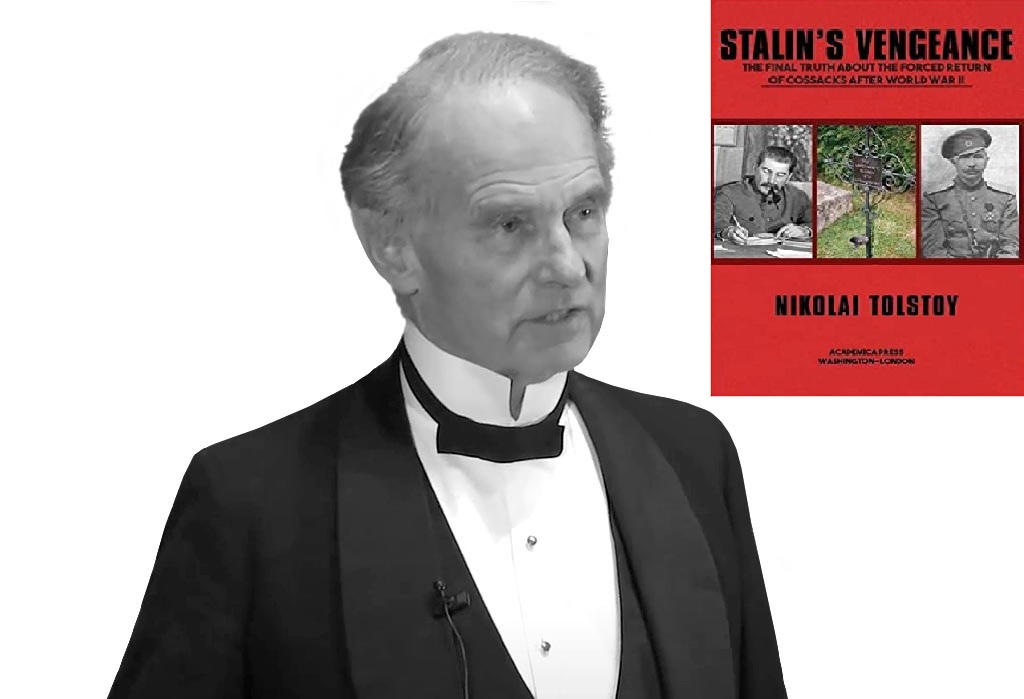By: Keith Miles
This book is the latest follow up by Nikolai Tolstoy to his previous books; The Victims of Yalta and The Minister and the Massacres. The second was contentious because it implicated Harold Macmillan who later became Prime Minister and it then led to a celebrated libel case. This case was lost by Nikolai Tolstoy but the huge damages awarded were dismissed by the European Court of Human Rights as excessive. In addition the book by Ian Mitchell about the trial The Cost of a Reputation showed many flaws, and that machinations took place.
The books by Tolstoy dealt with the forced return of Russian soldiers to Stalin under the Yalta agreement and in addition the return to Tito of Slovenes, Croats, and others. The books conclusively showed that many were returned against the policy laid down by Churchill and the orders of Field Marshal Alexander.
The latest book takes advantage of new archival evidence that Nikolai Tolstoy examined in the Russian archives , to which he gained access after the fall of communism and the Soviet Union. Also there is the evidence which is accumulating of large numbers of hidden graves in former Yugoslavia, the larger ones from the handovers. This evidence refutes what the defenders of the repatriations often tried to say when they said that the numbers of resulting deaths and suicides were much smaller and estimates in the early years were exaggerations. The latest book also lays to rest some of the misinformation that was floated to deliberately minimise the gravity of the illegal repatriations. It also points more clearly that the book by Christopher Booker The Looking Glass War which presented an establishment-pleasing conclusion seem like a sanitisation exercise.
The part of establishment involved and who were no doubt embarrassed by the whole matter seem to have indulged in a process of misquotation, understatement, overstatement, and lies.
Tolstoy is as he always has been fair to Churchill, Alexander and the Americans in his reporting of their positions. Churchill did not as a matter of government policy want anyone repatriated by force, Alexander gave an order to this effect, and the Americans despatched transport to evacuate all Cossacks to safety in the US zone of Germany. Also it was always clear that there was no agreement at Yalta with Stalin to send back non Soviet citizens, and no agreement with Tito, Stalin’s henchman at that time in the Balkans. Tolstoy is also fair to the ordinary British soldiers who constantly disliked what they were ordered to do.
However as the years have passed, and Nikolai Tolstoy has doggedly and determinedly sought further details and researched new evidence as it became available, it has become more and more clear that his deductions as to the truth of the matter have been shown to be most likely. Even in the absence of a mea culpa by one of the principle participants or the discovery of a ‘smoking gun’ piece of evidence inculpating Harold Macmillan (although there is for others) the conclusions of Tolstoy are easily the most plausible.
The book is built around the involvement of the Cossack General Peter Krasnov who fought in the Russian Civil War on the side of the White Armies against the Bolsheviks. He comes out as a decent and honourable man whose only military wish was to return Russia to some sort of democratic normality In this case he was similar in outlook to the Domobranci, but of course like them he was treading a very narrow path in allying with the Nazis. Like the Domobranci the Cossacks did not want to fight against the British or Americans only against communism, quite a risky tightrope to be on.
I fully recommend the book as giving the best historical analysis and commentary on the sad events of the repatriations.
Perhaps it is appropriate to quote from the book where Solzhenitzyn’s Russian television interview is included in an appendix:
‘When I was in England, I immediately addressed the English people on the radio, and said it is a disgrace this British betrayal… and it must somehow be atoned’
Tolstoy who is half British and half Russian is helping to make that atonement by his pursuit of the full truth.
Eminent historians have praised the book:
Andrew Roberts (Hoover Institution and Kings College, London): Nikolai Tolstoy’s passionate, well-researched, well written, and in my view unarguable denunciation of what amounts to a war crime in that terrible summer of 1945 will make Britons hot with shame three-quarters of a century later.
Brendan Simms (Cambridge University):
Nikolai Tolstoy is to be congratulated on sticking with this subject, turning up a wealth of new evidence, and reminding us that the handing over of the Cossacks to Stalin was not only morally reprehensible but in many cases a violation of international law.
Definitely a book to be read.

